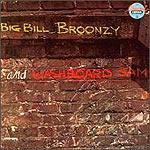
Washboard Sam steals this show
|
This review first appeared in the November/December 1991 issue of Living Blues magazine.
The dozen songs included in this package were recorded by Big Bill Broonzy and his (reported) half-brother Washboard Sam (Robert Brown) in 1953. They were joined in these sessions by bassist Ernest "Big" Crawford, Lee Cooper on guitar, and Memphis Slim on piano.
While Broonzy gets lead billing on the album (probably due to greater name recognition), to a large extent it is Washboard Sam who is featured. True, Broonzy plays guitar on all tracks (despite liner notes which credit Lee Cooper on the trio sides), but he only sings on four songs, with Sam handling the rest of the vocal duties.
The washboard is, like the musical saw or jug, a rarity: the accomplished player of it even more so. The original producers gave Washboard Sam plenty of room to exhibit his talent, and he responded generously. At times, he sets down a snare-type rhythm; at others, he creates rhythmic sounds which could only come from tapping and sliding seven thimbled fingers on a washboard.
One of the more interesting washboard creations comes when Sam backs Broonzy on "Romance Without Finance," where Washboard Sam achieves a ratchet-like sound, repeated it for a rolling effect.
Throughout, Sam and Crawford achieve a rhythmic interplay that is always tight and frequently inspired. When Memphis Slim is added on piano to make a small combo for several songs, you have one of the finest rhythm sections ever assembled.
As vocalist, Washboard Sam was no slouch, either. His rich baritone voice makes for a nice contrast to Broonzy's smooth tenor. This is especially apparent on "Shirt Tail," where Broonzy responds to to Sam's calls. Sam's own vocals are most riveting on "Bright Eyes," where he gives a haunting, searing performance.
Still, most readers will probably be more interested in this release because of Broonzy, and his performances are unlikely to disappoint. His voice is, as always, clear and strong, and his guitar playing is distinctively crisp. Broonzy wrote all four of the songs he sings, as well as "By Myself," which is sung by Sam. "Little City Woman" is the most captivating of the lot; perhaps Broonzy agreed, for "Jacqueline" is the same song with improved guitar figures and new lyrics.
The recording quality is outstanding throughout, and Studs Terkel's liner notes from the original release are included, along with updated thoughts from Bob Schnieder.
This is an album that serious collectors will value for being available in CD format, yet one that serves equally well for the rest of us as an informal introduction to the works of Broonzy and Washboard Sam.
